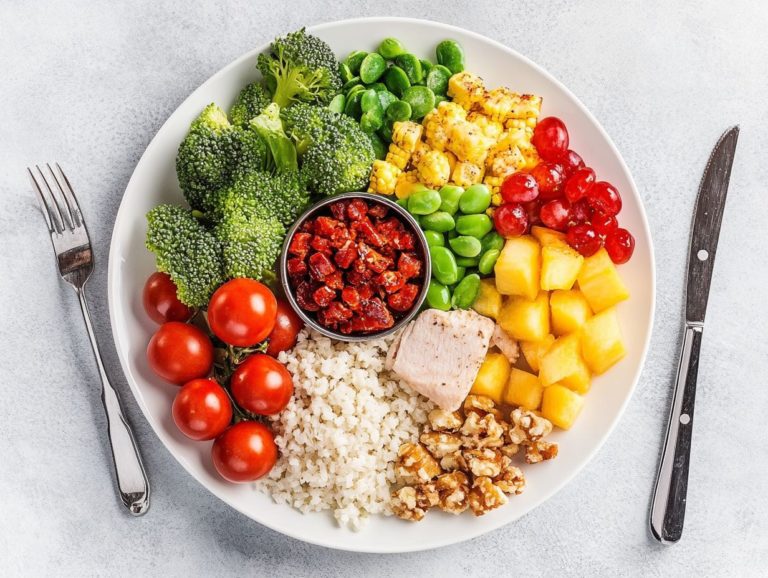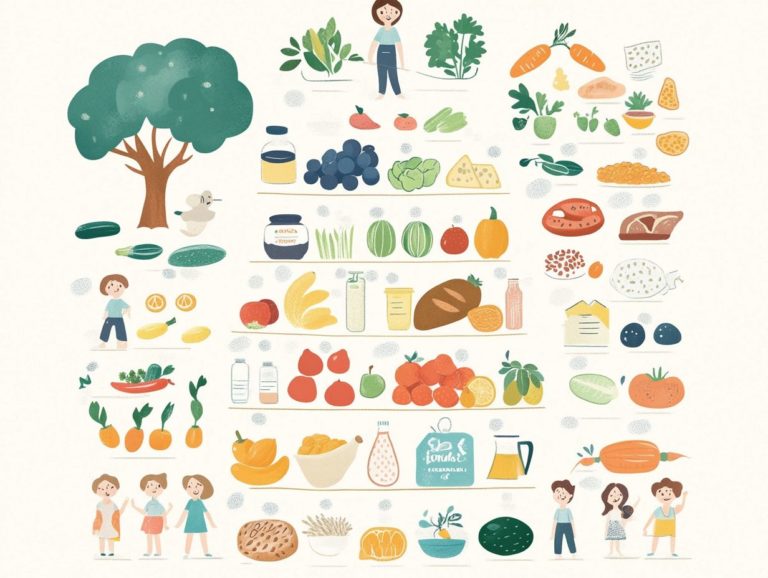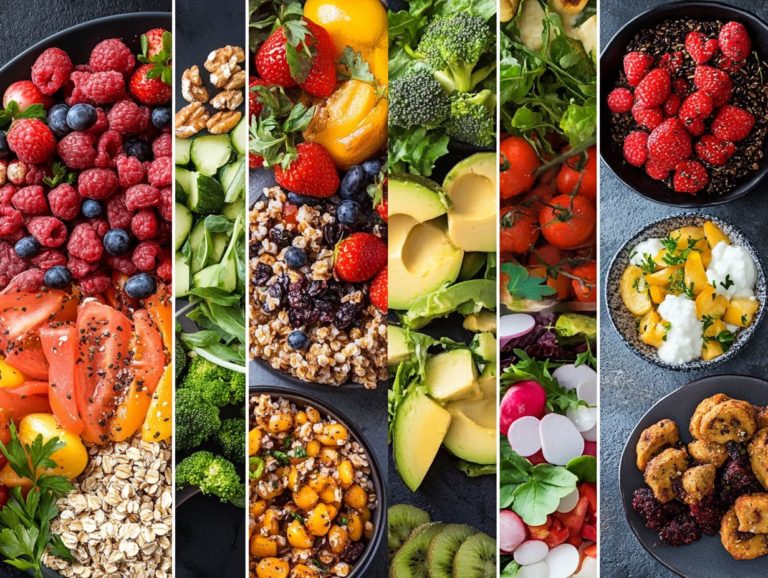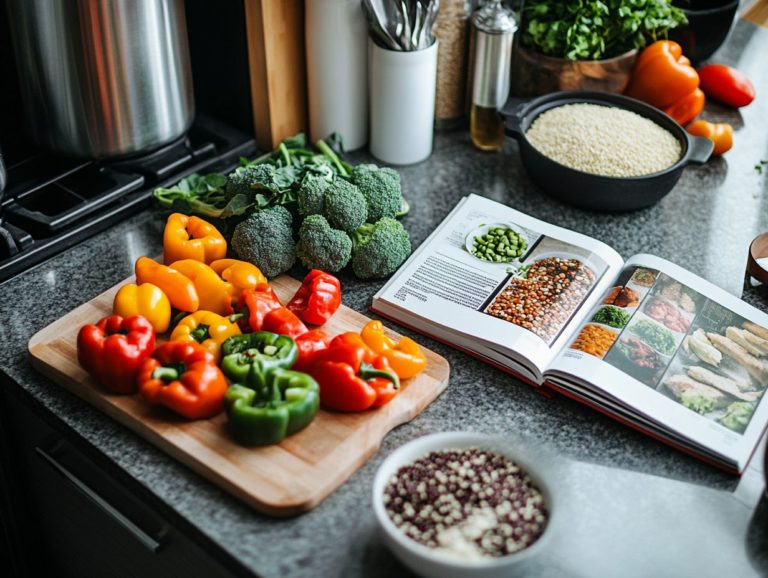How to Adapt Dietary Guidelines for Allergies
Food allergies can profoundly influence your daily life, highlighting the need to master the art of navigating dietary challenges.
This article delves into common allergens and their reactions. It emphasizes tailoring dietary guidelines to safeguard your health and well-being.
Uncover practical tips for identifying and avoiding allergens. Explore innovative ingredient substitutions and discover simple meal planning strategies.
Together, we can cultivate a balanced and enjoyable diet that accommodates food allergies while fulfilling your nutritional needs.
Contents
- Key Takeaways:
- Understanding Food Allergies
- Importance of Dietary Guidelines
- Tips for Adapting Dietary Guidelines
- Creating a Balanced Diet with Allergies
- Meal Planning and Preparation
- Frequently Asked Questions
- What are dietary guidelines?
- How can I adapt dietary guidelines for my allergies?
- What are common allergens that may impact my diet?
- Can I still follow dietary guidelines if I have multiple food allergies?
- Are there any resources available to help me adapt dietary guidelines for my allergies?
- Is it necessary to completely eliminate foods I am allergic to from my diet?
Key Takeaways:

Identify common allergens and reactions to create a safe and healthy diet.
Adapt dietary guidelines to prevent allergic reactions and maintain proper nutrition.
Substitute ingredients and plan meals carefully to create balanced and allergy-friendly meals.
Understanding Food Allergies
Understanding food allergies is essential for anyone making dietary choices, especially given their rising prevalence in today s society.
These allergies can lead to severe reactions, which highlights the need for awareness and effective management strategies to ensure safe eating.
According to FARE, around 32 million Americans are affected by food allergies. It’s vital to recognize common allergens and the potential reactions they can trigger.
Consulting with a registered dietitian can provide personalized nutritional recommendations. This fosters allergen awareness that enables safe food selections and meal preparation.
Common Allergens and Reactions
Common allergens, such as gluten, nuts, dairy, eggs, and soy, can cause a range of reactions in those who are sensitive. These responses may vary from mild irritations like hives and digestive discomfort to severe anaphylaxis, which demands immediate medical attention.
For anyone managing allergies, grasping these triggers is vital. The availability of allergen-free products in grocery stores is now essential, offering safer choices for consumers.
These products also bring peace of mind and elevate your shopping experience, allowing you to choose foods without the anxiety of unexpected reactions.
By raising awareness and understanding allergens, you can make informed decisions, safeguarding your health and well-being.
Importance of Dietary Guidelines
Dietary guidelines are essential for achieving balanced nutrition while addressing unique health concerns, especially food allergies.
These guidelines clarify which ingredients to avoid and encourage safe eating practices while upholding food safety standards.
Partnering with a registered dietitian can enhance your journey, enabling you to develop a personalized nutrition plan that adheres to these guidelines.
This approach helps you maintain a healthy diet while effectively managing your food allergies.
Why Adapt Guidelines for Allergies?
Adapting dietary guidelines for allergies is crucial for accommodating your food preferences while avoiding allergens that could trigger health issues. Learning how to adjust meal plans for allergies can help you navigate these challenges effectively.
Access to tailored meal plans is vital for anyone with specific dietary restrictions, allowing you to address unique health needs effectively.
By incorporating allergen-free meal options, you create a safe dining environment for your family. This ensures that everyone can enjoy shared meals without the anxiety of potential exposure.
Knowing the complexities of food allergies empowers you to make smart choices, whether you’re grocery shopping or dining out.
The importance of comprehensive education on food substitutions and allergen identification cannot be overstated. It plays a significant role in fostering a safer culinary landscape for everyone.
Tips for Adapting Dietary Guidelines

Adapting dietary guidelines effectively requires a keen understanding of ingredient exclusions. For more insights, check out how to customize dietary guidelines for your needs. This knowledge allows you to make informed food choices that ensure safe eating for those with food allergies.
By prioritizing awareness and knowledge, you can navigate menus and labels with confidence. This safeguards your health while enjoying a diverse range of foods.
Start reading labels today and discover safe options for you and your family!
How to Identify and Avoid Allergens
Identifying and avoiding allergens is essential for anyone with food allergies. It demands a keen understanding of food labels and allergen awareness.
This process requires you to carefully check ingredient lists on packaging. You must remain vigilant about potential cross-contamination that can arise during manufacturing.
Be sure to look for common allergens such as:
- Peanuts
- Dairy
- Gluten
- Shellfish
These allergens can often be cleverly concealed in processed foods. Familiarizing yourself with terms associated with allergens is beneficial, and consulting dietary resources that highlight safe food options is essential.
By implementing effective allergen avoidance strategies, you can significantly enhance your quality of life, enabling yourself to make informed nutritional choices while minimizing the risk of adverse reactions.
How to Substitute Ingredients
Substituting ingredients is a smart way to create allergen-free meals while staying true to your dietary restrictions. It helps maintain a balanced diet.
For example, swapping dairy milk for almond or oat milk accommodates lactose intolerance. It also introduces new nutrients like vitamins and healthy fats.
Similarly, using chickpea flour instead of traditional wheat flour provides a gluten-free option. This boosts protein content and adds a delightful nutty flavor.
This flexibility in ingredient swaps allows you to personalize your nutrition. You can cater to various food preferences while ensuring your meals remain satisfying and delicious.
Being mindful of these substitutions can spark creativity in your meal preparation. Transform cooking into a fun and engaging experience!
Creating a Balanced Diet with Allergies
Crafting a well-rounded diet while managing food allergies demands a deep understanding of your nutritional needs. You must skillfully navigate food products with finesse.
Ensuring Adequate Nutrition
Ensuring you have adequate nutrition is essential when navigating food allergies. This requires thoughtful food choices and a clear understanding of food allergens.
Not just knowing what to avoid is important. You must also make sure to eat different healthy foods in your daily meals.
A balanced diet is vital, as it supplies the essential vitamins and minerals necessary for your optimal health. By creating personalized nutrition plans tailored to your unique needs, you can significantly enhance your well-being.
This will help you maintain energy levels and overall vitality. Exploring safe alternatives and incorporating whole foods into your diet will enable you to navigate your dietary restrictions.
Still, you can enjoy a diverse and satisfying menu.
Meal Planning and Preparation

Effective meal planning and preparation are crucial for anyone navigating food allergies. Don t leave your health to chance!
By implementing these strategies, you can ensure safe eating while significantly minimizing the risk of cross-contamination during food interactions.
Strategies for Meal Planning
Implementing effective meal planning strategies is essential for anyone with food allergies. This ensures that your dietary needs are met while prioritizing nutrition and food safety.
By understanding your individual triggers and carefully selecting ingredients, you can enjoy a diverse range of meals. This prevents potential allergic reactions.
A well-structured plan enables you to create balanced dishes that align perfectly with your health goals and preferences. It s important to develop an organized shopping list that includes safe alternatives for common allergens.
Keep an eye on potential cross-contamination in stores. Navigating the grocery aisle demands vigilance, and reading labels diligently will help you make informed choices.
Maintaining food safety at home through proper storage and preparation techniques enhances your ability to thrive on a restricted diet without sacrificing flavor or variety.
How to Prepare Allergy-Friendly Meals
Preparing allergy-friendly meals requires a solid understanding of safe cooking techniques and the ability to select the right food products that align with your specific dietary restrictions.
This journey begins with thorough research. Ensure every ingredient you choose is free from common allergens like peanuts, dairy, and gluten.
Pay close attention to labels and understand that cross-contamination happens when allergens transfer from one food to another. It’s crucial to be careful to maintain safe eating practices.
When planning your meals, focus on fresh, whole foods. These are generally less likely to harbor hidden allergens.
Utilizing separate cooking utensils and equipment can significantly reduce the risk of cross-contact.
Taking careful steps helps you create delicious meals that cater to specific dietary needs. Everyone at your table can enjoy the feast without worry!
Frequently Asked Questions
What are dietary guidelines?
Dietary guidelines are recommendations for healthy eating based on scientific evidence designed to promote overall health and well-being.
How can I adapt dietary guidelines for my allergies?

If you have allergies, make sure to identify and avoid the specific foods that trigger your allergies. This may require modifying your diet while following certain dietary guidelines to still meet your nutritional needs.
What are common allergens that may impact my diet?
Common allergens that may impact your diet include peanuts, tree nuts, milk, eggs, soy, wheat, fish, and shellfish. Read food labels carefully and be aware of potential cross-contamination when preparing and consuming foods.
Can I still follow dietary guidelines if I have multiple food allergies?
Yes! It is possible to follow dietary guidelines even if you have multiple food allergies. It may require more careful planning, but with the help of a healthcare professional or registered dietitian, you can maintain a healthy and balanced diet.
Are there any resources available to help me adapt dietary guidelines for my allergies?
Absolutely! There are many resources available such as allergy-friendly cookbooks, online recipes, and dietitian services that can help you adapt dietary guidelines to meet your specific needs and preferences.
Is it necessary to completely eliminate foods I am allergic to from my diet?
In most cases, you must completely avoid foods you are allergic to in order to prevent an allergic reaction. However, with the help of a healthcare professional, you may slowly introduce small amounts of the allergen into your diet over time, depending on the severity of your allergy.






